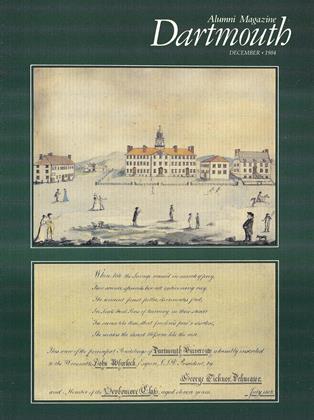Several court matters relating to the College have recently received resolutions of some sort.
The matter variously referred to as "the GSA taping incident" and "the Polenz case" will not be further prosecuted by either the state of .New Hampshire or any official adjudicative bodies of the College. Following the secret taping of a Gay Students Association meeting by a reporter from The Dartmouth Review, Teresa Polenz '87, and The Review's publication of a partial transcript of the proceedings, the College began disciplinary hearings on the matter. Those hearings were suspended when word was received that the New Hampshire Attorney General's office was investigating the matter for possible violations of state statutes. The state decided in early October that it would not press criminal charges in the incident at least in part because of a recent statement by the New Hampshire Supreme Court that the state's eavesdropping statute does not apply when the person doing the secret taping is a party to the taped conversation. And according to an October 29 letter from Dean Edward Shanahan, "as a result of this decision . . . the student has been informed that the COS [Committee on Standards] will not be pursuing the matter further." Shanahan cited as the reason for his decision the fact that the two applicable College rules the "Principle of Community" and the "Academic Honor Principle" are both "problematic." He said that "the former has been treated at this institution as a non-adjudicable principle, and the latter has related only to those formal academic exercises specified ... in the Student Handbook and the ORC [Organization, Regulations, and Courses]. Consequently," he concluded, "the College does not now have a clear and precise enough regulation under which to judge conduct of this kind." While noting that he had asked College counsel "to begin developing language for inclusion in the Code that would permit the institution to respond in the future," he called for individuals within the College community "to speak out against damaging or hurtful behavior." He stated that "expressions of public disapprobation, or even public censure, can be constructive antidotes perhaps the best antidotes for instarices of insensitivity or misbehavior that may at times lie beyond the technical reach of disciplinary procedure."
In another case involving the Review Music Professor William Cole's $2.4million libel suit brought in federal court in Vermont against the publication and three of its editors Judge Franklin Billings has ordered the dismissal from the case of the three individual editors Laura Ingraham '85, E. William Cattan Jr. '83, and Dinesh D'Souza '83.
The other major judicial matter involves the fraternity Bones Gate, assessed a fine in late September for providing alcohol to minors at a party in November 1984. Grafton County Superior Court Judge Walter Murphy handed down a fine of $25,000, $20,000 of which will be suspended if the fraternity remains on good behavior for three years. According to The Valley Neivs, the decision was the result of a plea agreement in which Bones Gate agreed to plead guilty to seven counts of providing liquor to minors and the state agreed to drop charges for selling liquor without a license. The College had put Bones Gate on social probation for four months last year, and the house is on general probation, without specific restrictions, through the end of fall term. Bones Gate's attorney was quoted as saying that the fraternity has changed its policy toward alcohol as a result of the incident, and the house president said that Bones Gate willingly gave up its right to a jury trial and acknowledged its guilt.
 View Full Issue
View Full Issue
More From This Issue
-
 Feature
FeatureThe College Today
December 1984 -
 Cover Story
Cover StoryDartmouth Hall (1784-1984) A Bicentennial Tribute
December 1984 By Charlotte K. Younger -
 Feature
FeatureChronicling the DOC
December 1984 By David O. Hooke '84 -
 Feature
FeatureHanover's Bests
December 1984 -
 Article
ArticleLover of parades
December 1984 By Peggy Sadler -
 Class Notes
Class Notes1940
December 1984 By Richard J. Goulder







